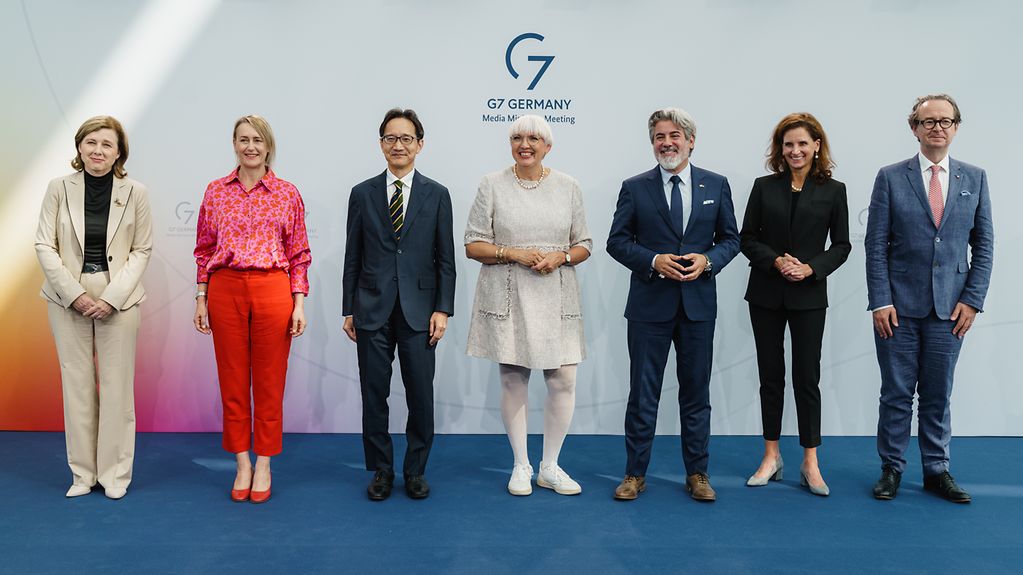Meeting of the G7 Media Ministers
Strengthening freedom of the press and freedom of opinion, combating disinformation and protecting journalists – these were the key issues discussed at the meeting of the G7 Media Ministers. They met for the first time at the invitation of Minister of State Roth on 19 June in Bonn.

Minister of State Roth with her counterparts from the G7 countries and the EU at the Media Ministers’ meeting in Bonn
Photo: BKM
“In the global conflict between the ideal of democracy and authoritarian forms of government, we must clearly assert the importance of a free press and the protection of media professionals in democratic systems,” said Minister of State Roth at the start of the meeting of G7 Media Ministers in Bonn.
Roth engaged in discussions with her counterparts on issues relating to the media and the information society that require a global response. The Minister of State for Culture and the Media succeeded in integrating media policy as an independent topic area as part of the G7 process for the first time.
Sending out a powerful signal for the culture of democracy
Minister of State Roth was positive about the outcome of the first meeting of G7 Media Ministers. “With the communiqué unanimously adopted here today, the G7 countries have sent out a powerful signal – a signal of unity,” she said. “A signal in support of the culture of democracy – both in the G7 countries and beyond,” Roth continued.
G7 Media Ministers’ Communiqué
The meeting also showed that the G7 countries were united in their aim to combat disinformation and defend the freedom of the press, said the Minister of State for Culture and the Media. “After all, media policy is democratic policy, too,” stressed Roth. As such, media policy is to be anchored even more firmly at the international level as a category of its own in the future, she said.
Protecting press freedom and journalists
When democracies are attacked, it is all too often journalists and the media whose rights are curtailed. For this reason, the meeting focused on protecting the freedom of the press and freedom of expression – especially in times of crisis. Attending the meeting via video link, the Ukrainian Minister of Culture and Media Oleksandr Tkachenko reported on the current situation in his country.
The G7Media Ministers declared their solidarity with Ukraine and pledged their full ongoing support. Journalists and the free press were among the first targets in the Russian war of aggression against Ukraine too, the communiqué said.
The Media Ministers also welcomed the so-called “Democracy Newsroom” – an initiative planned by the news agencies of the G7 partner countries. This will aim to consolidate information on democratic developments worldwide and offer training for journalists. Minister of State Roth announced that she would support the preparation of a feasibility study for this purpose.
Dialogue with international media professionals
Representatives of the media and civil society were involved in more than just the meeting of the G7 Media Ministers. Together with her counterparts, Minister of State Roth will also be attending the Global Media Forum. hosted by Deutsche Welle on 20 June. On the theme of “Shaping tomorrow, now!”, the Media Ministers will engage in dialogue with media actors from all over the world.
The results of the meeting and the jointly adopted communiqué will feed into the G7 Summit which takes place in Schloss Elmau from 26 to 28 June. Minister of State Roth will organise and lead the ongoing process of the G7 Media Ministers during the German G7 Presidency until 31 December 2022.
Germany assumed the G7 Presidency in 2022. In addition to the annual summit meeting of the G7 Heads of State and Government, the meetings of the G7 ministers also has a key role play in the Presidency year. The “Group of G7 countries” consists of Germany, France, the UK, Italy, Japan, Canada and the USA. The European Union is also represented at all G7 meetings.